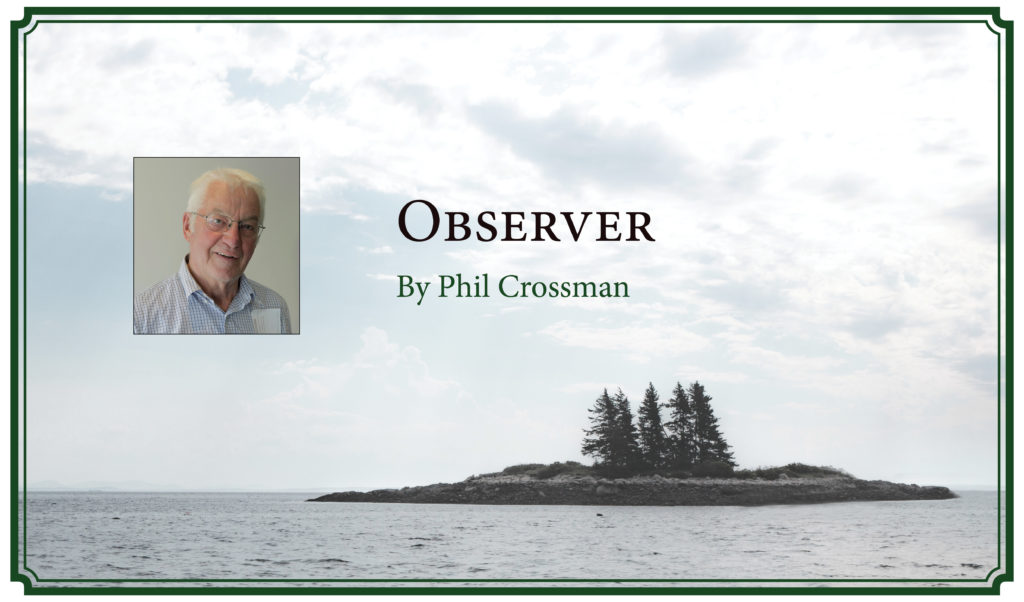By Phil Crossman
In 1958, my grandfather, Ted Maddox, then our representative to the Maine Legislature, brought Sen. Edmund Muskie to Vinalhaven to attend the Fourth of July celebrations. Grampa escorted the senator up onto the speaker’s platform.
I was loitering in the alley across the street because a mischievous uncle had offered a firecracker, even lit it for me, and said, “I dare you!” I needed no further enticement. It exploded at their feet. I thought Muskie’s stalwart composure was pretty impressive—for a Democrat—and have been an admirer since.
My memory of people like Eisenhower, Margaret Chase Smith, my grandfather, Reagan, and later, Snowe and Collins, sustained my allegiance for half a century. I credited Republican efforts with re-building Europe, desegregation, passage of the Civil Rights Act, with containing communism, and with fostering the collapses of the Berlin Wall and Soviet Union. The most profound political moment of my life was when Reagan and Gorbachev signed the Nuclear Forces Treaty in 1987.
During that youthful period, we were applauding Ed Muskie and Margaret Chase Smith simultaneously. They were a great team, even on opposite sides of the fence—sensitive to the realities that were the lives of their Maine constituents and each aware that good government emerges from accommodation, good leadership from compromise.
I am hard-pressed now to find other Republicans, certainly not in the public arena, whose principles and capacity for measured consideration have not become bizarrely skewed.
And as those values crumbled, manifest in decisions or behavior that shamed, or at least troubled me, such as enhanced interrogation and mindless intransigence, or knee-jerk military adventurism, and the frenzied bailout of the auto industry and AIG, my allegiance waned. I was still a Republican but thinking about becoming an anarchist.
And then Sen. Mitch McConnell proclaimed that Republican members of Congress had no more immediate goal than to see that President Obama was not allowed a second term. I was aghast. The best we could do had come to this.
A girl once flattened her brother when, after his first-ever day at school, he stood gleefully waving goodbye to me, his first bus driver, oblivious to his younger sister barreling down the starboard sidewalk, having been released from her nearby house to welcome him home with an eagerness that knew no bounds.
As it happens, that eagerness, no less boundless, has followed them both, and during the 2017 Maine gubernatorial primaries, she wrote me from Eastern Europe, where she was helping refugees from nearby horrors, asking if I would write a letter recommending that she be given a position in the upcoming campaign, as she wanted to see Janet Mills bring a breath of fresh air to the Blaine House. I was delighted and composed a heartfelt recommendation.
Before I sent it on its way, however, it occurred to me to wonder whether she knew I was a Republican. Friends had for years been expressing skepticism about that allegiance when the topic arose, as it now and then did. Clearly, my transition was apparent to others before it was to me.
I thought about the likelihood that whoever read my recommendation might be interested enough in its author to do some research and would quickly discover I’d been a Republican for over half a century, rendering the recommendation somewhat suspect. So I added a post script, acknowledging that I was no longer a Republican and had, that very day in fact, and in large part because of this young woman’s passion, gone to my town office and begun the process of becoming a Democrat, which I then did and which, I now am.
Phil Crossman lives on Vinalhaven where he serves as a town selectman.





